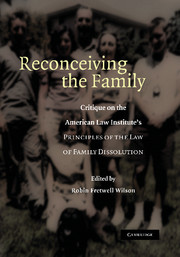 Reconceiving the Family
Reconceiving the Family Published online by Cambridge University Press: 25 January 2010
This chapter analyzes Chapter 7 of the Principles, which deals with agreements. It contrasts the ALI's treatment of premarital, marital, and separation agreements with both current doctrine and arguments for respecting greater private ordering regarding marriage. While largely agreeing with the ALI's approach, this chapter urges an approach somewhat more respectful of party choice and more sensitive to the variety of marriage-related agreements.
The current treatment of premarital, marital, and separation agreements reflects a view that, in a world where entrance into marriage and exit from it is largely within the control of the partners, it seems consistent to allow the partners some choice regarding the nature of the marriage they decide to enter, or not to exit. Part I of this chapter deals with premarital agreements; Part II with marital agreements; and Part III with separation agreements. Each part begins with an overview of current law, followed by a summary of the Principles' position, and an evaluation of that position.
Premarital Agreements
Overview and Current Doctrine
Premarital agreements, also called “antenuptial” and “prenuptial” agreements, are entered into when marriage is imminent, to settle, create, or modify certain rights between the parties during their marriage, upon the death of one of the partners, or upon divorce. The following discussion focuses on premarital agreements meant to modify the rights of the spouses upon divorce.
To save this book to your Kindle, first ensure no-reply@cambridge.org is added to your Approved Personal Document E-mail List under your Personal Document Settings on the Manage Your Content and Devices page of your Amazon account. Then enter the ‘name’ part of your Kindle email address below. Find out more about saving to your Kindle.
Note you can select to save to either the @free.kindle.com or @kindle.com variations. ‘@free.kindle.com’ emails are free but can only be saved to your device when it is connected to wi-fi. ‘@kindle.com’ emails can be delivered even when you are not connected to wi-fi, but note that service fees apply.
Find out more about the Kindle Personal Document Service.
To save content items to your account, please confirm that you agree to abide by our usage policies. If this is the first time you use this feature, you will be asked to authorise Cambridge Core to connect with your account. Find out more about saving content to Dropbox.
To save content items to your account, please confirm that you agree to abide by our usage policies. If this is the first time you use this feature, you will be asked to authorise Cambridge Core to connect with your account. Find out more about saving content to Google Drive.